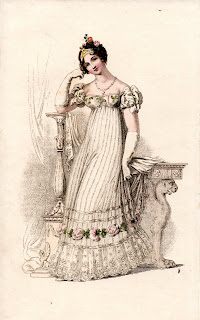I finished the Marquess and Governess story on time (Yay, me!) , after a marathon of writing, and I’ve now caught up on my Downton Abbey.
While I was in my flurry of writing, I distracted myself by thinking of what I’d do to reward myself. I have several plans. Like get my hair cut (finally!!). Buy some new make-up. Go to Old Town Alexandria to this terrific little tea shop there.
I turned the book in on Friday and on Saturday I did have a little reward. I attended an all day seminar at the Smithsonian called Regency England’s Pleasures and Paradoxes presented by Lorella Brocklesby, an adjunct professor at New York University.
She took a look at the architecture of Regency England, the development of Regent Street, Regent’s Park, the Pavilion, and Carlton House, as well as a few other places. She talked a little about artists Turner and Benjamin West, and caricaturists like Gillray. She touched on some of the paradoxes, such as child labor.
The session was sold out, a couple hundred people, maybe. The speaker was charming and the audience seemed to enjoy the whole thing, but for a Regency Romance author, it just didn’t work for me.
For one thing, she defined the Regency in very broad terms, from 1750 to 1838. That would be okay, but she skipped around a lot in those dates, so, if you didn’t know beforehand, you would know exactly what happened when.
She also was imprecise in her facts. For example, she spoke about Harriette Wilson, mentioning her book, but neglected to say she was a famous courtesan. She also talked about Jane Austen, but got her facts wrong. She said Austen never dedicated a book to the Prince Regent, but, of course, she did.
Austen’s dedication to the Prince Regent in Emma was brilliant:
To His Royal Highness, the Prince Regent, this work is, by His Royal Highness’s permission, most respectfully dedicated, by His Royal Highness’s dutiful and obedient humble servant, the author.
Those are just a few of the examples.
Most Historical authors like to deal with precision–What exactly would they have eaten? What exactly happened in May of 1816?–so this seminar was frustrating in its imprecision.
Still, there were good parts. I went with my friend Mary Blayney, and we met my friend Virginia there. We had great conversation at lunch at the Natural History museum, so the day was not a total flop.
So, what do you reward yourself with after a period of hard work? And what was the most disappointing thing you’ve attended?


Wow, good post, Diane. And good questions! I usually reward myself with a purse or something girly. Nothing fancy, mind, just some odd or end of which I’ve been purposely deprived. Sad to see that a Regency seminar disappointed! We never get anything like that around here, so I would be extremely upset to actually have the opportunity to attend one, all to hear non-truths and inaccuracies.
Unfortunately, I can’t think of anything at the moment which disappointed me that greatly. My husband and I did go to a rather fancy-schmancy restaurant last week (on a gift certificate, mind), and were more than a little shocked to see the “special appetizer” we agreed upon (crab claws & 4 butterflied, battered shrimp) turned out to be $40. We didn’t know this until we received the bill. Guess we’re just not cut out for that kind of highfalutin. 😉
When I messed up my back, I rewarded myself with pieces to my Renaissance costume. I haven’t learned to reward myself for accomplishing writing goals, yet. I’m still simply happy when it’s done.
My counselor asked me to watch The Breakup, I think it was. He wanted my reaction to the brother. When I returned for my next visit, I told him he owed me $2 and 2 hours of my life back. If it hadn’t been an assignment, I would have walked out, which I have done before. It was exactly what I expected, which is why I never planned to see it, until it became homework. What’s more, it pretty much flopped as homework as well, because the brother wasn’t nearly extreme enough. My counselor, bless him, apologized and took it off his list of recommendations.
Alyssia,
Your dinner experience reminds me of when my husband and I were young and poor and we went out with our friends, another young and poor couple who did have some good political connections. Anyway, we went to this restaurant in Washington DC that they’d heard of and when we walked in they gave the men ties and coats (this should have been a clue). We were given bread which we scarfed down. And then we saw the prices! We paid for the bread, left, and went to an Italian place down the street and had a huge dinner for 4 for what we had paid for the bread!
Judy, now I may have to see The Breakup just to see why it was so awful!
You deserved a reward for a back injury! If your back hurts everything hurts.
Hi Diane,
I’ve heard Lorella Brocklesby speak before at NYU on The Dollar Princesses, and was amazed by how much information she got wrong. I found her handout more informative than the lecture!
She did have some good references, Elizabeth…
Another quibble…she mentioned the “dress dampening” thing….
Eeek! It must have been so hard not to jump up and yell “You’re wrong!” 🙂 That would have made me crazy…